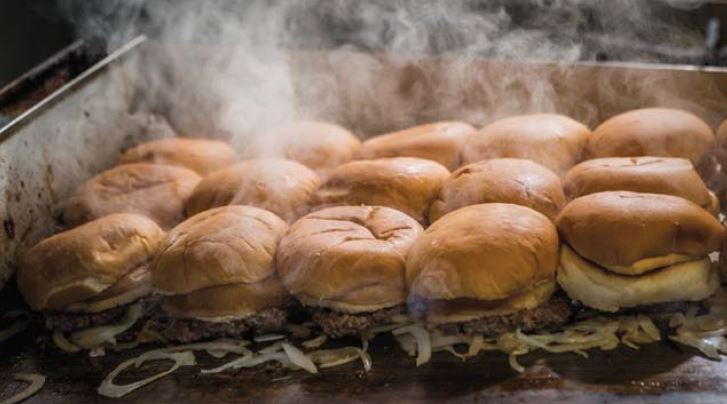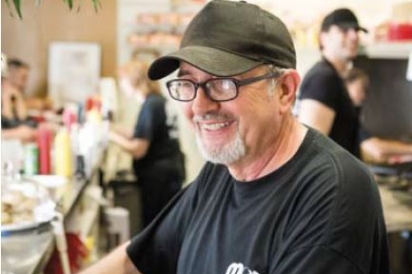Local Chefs Get Creative with Sliders
Twenty-five years ago, Tammy Brock saw a Help Wanted sign in the window at Motz’s Burgers. They took it down when she stepped in the door, and she’s been cooking what many believe are some of the area’s best sliders ever since.
“I’m not gonna lie,” she says. “This is the only place that I’ll eat a burger.” Many of Motz’s regulars say the same thing. Some have been coming for twice as long as Tammy’s been cooking; Motz’s Burgers was established in 1929.
“The slider is Motz’s. It is White Castle,” says Chef Les Molnar of Green Dot Stables in Detroit. The White Castle chain, originally out of Kansas, is indeed credited as the inventor of the mini-burger in 1921. The burger company’s founders apparently aimed to convince the public that good cheap burgers in small sizes—originally selling for a nickel each—were not going to kill them despite what they’d read in the 1906 best-seller The Jungle by Upton Sinclair.
But the chain did refer to them as “burgers.” In fact, of the three slider experts interviewed for the story, Molnar was the only one to venture at the concoction’s name. “We always called them ‘gut bombs’ growing up. The concept is, they slide right down and—well, you get the idea.” A little bit of grease is essential. “They gotta be a little messy, a little fatty.”
While sliders no longer sell for a nickel anywhere, they can be offered at a low price point. That’s one of the things Chef Brennan Calnin of Public House in Ferndale loves about them. “They’re fun,” says Calnin. “You can come in if you’re kind of hungry but don’t want a whole cheeseburger, get the flavor of one and have it with a beer for 10 bucks.”
At all three restaurants, the average customer eats four sliders; the record is in the low teens. While most eaters order multiples of the same type, intrepid souls have been known to cross the streams and order several different types.
Green Dot features close to a dozen varieties, featuring fish, poultry, bologna, vegetarian and more. “Occasionally, I’ll get a purist who says that I’m not serving sliders, and I’m happy to concede that they’re small sandwiches. They’re a great format to come up with some wild combinations.” A favorite of his is the Korean burger, which features a beef patty slathered in peanut butter sauce and topped with kimchi. “I know it sounds incredibly weird,” he says. “But it just works.” The inspiration? He laughs and says, “Late night at the bar.”
Still, it’s not the number one item on the menu, where cheeseburgers and the weekly mystery meat burger are neck and neck. “I’m adventurous,” he says. “I started working with Sierra Farms in Nevada. They raise antelope.” When he found out he could also get alligator, kangaroo, camel and more, he was up for them all. “People love the mystery meat.” Not every entry in the category has received rave reviews. One particular disaster: boar testicles served with a cottage cheese and bacon sauce. “That one really shouldn’t have gone out.”
Being able to take risks is part of the chef gig. For Calnin, it wasn’t boar parts, but jackfruit that went down in his “never try again” file. “I used a ripe jackfruit. I should have used green,” he admits. “It was unpalatable.” As with Molnar, the disasters are rare; the triumphs, evidenced by Public House’s ecstatic customers, are much more the norm. “I’m a big fan of our smoked portabello mushroom sandwich,” says Calnin. “We serve it with a Malbec blackberry jam, local Michigan mustard, pickled onion and watercress. It eats like a fancy burger.”
Public House changes the menu frequently; in recent months, the restaurant featured a sandwich made with smoked pork butt, topped with a Carolina mustard glaze and Indian spiced carrot chutney. A pork and lamb burger features a Middle Eastern-inspired mint chutney instead of ketchup.
Motz’s, Green Dot and Public House all grind their meat in-house daily. They also all depend on fresh and local ingredients as often as possible. At Motz’s, Brook chops a 50-pound bag of onions by hand each work day. Motz’s uses local buns from Brown’s Bread on West Vernor. The Public House serves bread from Mike Bird’s Indian Hill Bakery in Pontiac.
It’s that sense of getting a great deal and of food that offers serious satisfaction as it refuses to take itself too seriously, that unites these three very different places. And then there’s passion. “My secret is: I cook with love,” says Tammy Brock. “I absolutely love my job.” Molnar and Calnin are just as dedicated. Both trained as chefs, apprenticed in Chicago and elsewhere, and believe passionately in Detroit’s potential as a food hub. And it starts with burgers.
“There’s just something about a cheeseburger that’s just so right,” says Molnar. Drop into any of these restaurants for a burger—or two, or six or 13—that feels exactly right.







